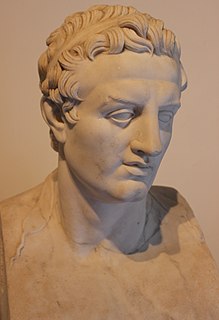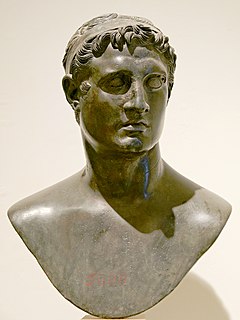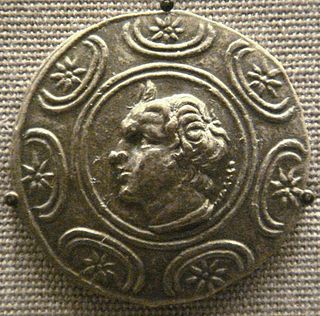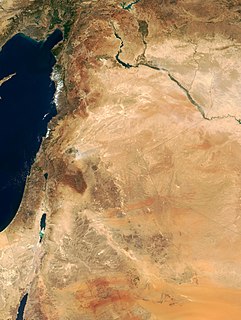Related Research Articles

The 3rd century BC started the first day of 300 BC and ended the last day of 201 BC. It is considered part of the Classical era, epoch, or historical period.
This article concerns the period 229 BC – 220 BC.

This article concerns the period 309 BC – 300 BC.
During the 290s BC, Hellenistic civilization begins its emergence throughout the successor states of the former Argead Macedonian Empire of Alexander the Great, resulting in the diffusion of Greek culture throughout the Levant and advances in science, mathematics, philosophy, etc. Meanwhile, the Roman Republic is embroiled in war against the Samnites, the Mauryan Empire continues to thrive in Ancient India, and the Kingdom of Qin in Ancient China, the one which in the future will conquer its adversaries and unite China, begins to emerge as a significant power during the Warring States period.
This article concerns the period 289 BC – 280 BC.
This article concerns the period 279 BC – 270 BC.
This article concerns the period 259 BC – 250 BC.
This article concerns the period 249 BC – 240 BC.
Year 221 BC was a year of the pre-Julian Roman calendar. At the time it was known as the Year of the Consulship of Asina and Rufus/Lepidus. The denomination 221 BC for this year has been used since the early medieval period, when the Anno Domini calendar era became the prevalent method in Europe for naming years.

Ptolemy III Euergetes was the third pharaoh of the Ptolemaic dynasty in Egypt from 246 to 222 BC. The Ptolemaic Kingdom reached the height of its military and economic power during his kingship, as initiated by his father Ptolemy II Philadelphus.
Year 275 BC was a year of the pre-Julian Roman calendar. At the time it was known as the Year of the Consulship of Dentatus and Caudinus. The denomination 275 BC for this year has been used since the early medieval period, when the Anno Domini calendar era became the prevalent method in Europe for naming years.

Year 272 BC was a year of the pre-Julian Roman calendar. At the time it was known as the Year of the Consulship of Cursor and Maximus. The denomination 272 BC for this year has been used since the early medieval period, when the Anno Domini calendar era became the prevalent method in Europe for naming years.

Year 279 BC was a year of the pre-Julian Roman calendar. At the time it was known as the Year of the Consulship of Publius Sulpicius Saverrio and Publius Decius Mus. The denomination 279 BC for this year has been used since the early medieval period, when the Anno Domini calendar era became the prevalent method in Europe for many years.
Year 280 BC was a year of the pre-Julian Roman calendar. At the time it was known as the Year of the Consulship of Laevinus and Coruncanius. The denomination 280 BC for this year has been used since the early medieval period, when the Anno Domini calendar era became the prevalent method in Europe for naming years.
Year 281 BC was a year of the pre-Julian Roman calendar. At the time it was known as the Year of the Consulship of Barbula and Philippus. The denomination 281 BC for this year has been used since the early medieval period, when the Anno Domini calendar era became the prevalent method in Europe for naming years.
Year 286 BC was a year of the pre-Julian Roman calendar. At the time it was known as the Year of the Consulship of Corvus and Paetus. The denomination 286 BC for this year has been used since the early medieval period, when the Anno Domini calendar era became the prevalent method in Europe for naming years.

Ptolemy II Philadelphus, also known posthumously as Ptolemy the Great, was the pharaoh of Ptolemaic Egypt from 284 to 246 BC. He was the son of Ptolemy I, the Macedonian Greek general of Alexander the Great who founded the Ptolemaic Kingdom after the death of Alexander, and Queen Berenice I, originally from Macedon in northern Greece.

Pyrrhus was a Greek king and statesman of the Hellenistic period. He was king of the Greek tribe of Molossians, of the royal Aeacid house, and later he became king of Epirus. He was one of the strongest opponents of early Rome, and had been regarded as one of the greatest generals of antiquity. Several of his victorious battles caused him unacceptably heavy losses, from which the term "Pyrrhic victory" was coined.

Antigonus II Gonatas was a Macedonian ruler who solidified the position of the Antigonid dynasty in Macedon after a long period defined by anarchy and chaos and acquired fame for his victory over the Gauls who had invaded the Balkans.

The Syrian Wars were a series of six wars between the Seleucid Empire and the Ptolemaic Kingdom of Egypt, successor states to Alexander the Great's empire, during the 3rd and 2nd centuries BC over the region then called Coele-Syria, one of the few avenues into Egypt. These conflicts drained the material and manpower of both parties and led to their eventual destruction and conquest by Rome and Parthia. They are briefly mentioned in the biblical Books of the Maccabees.